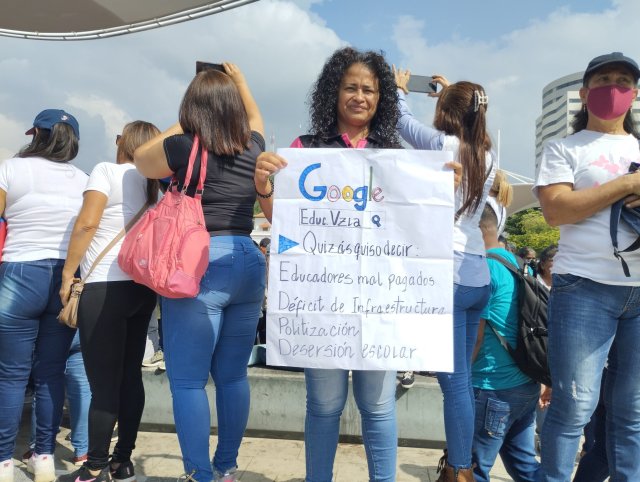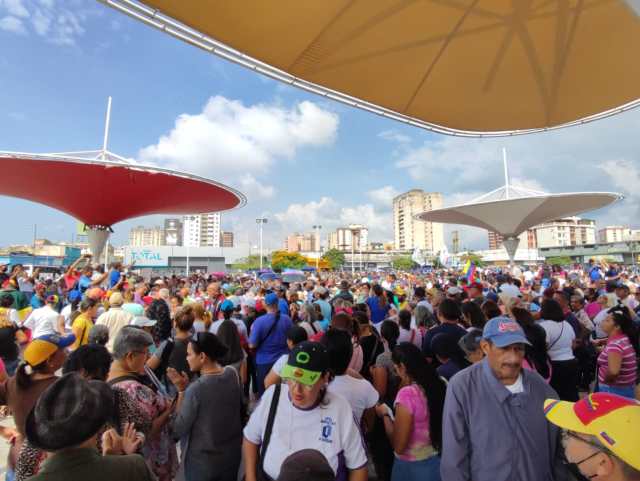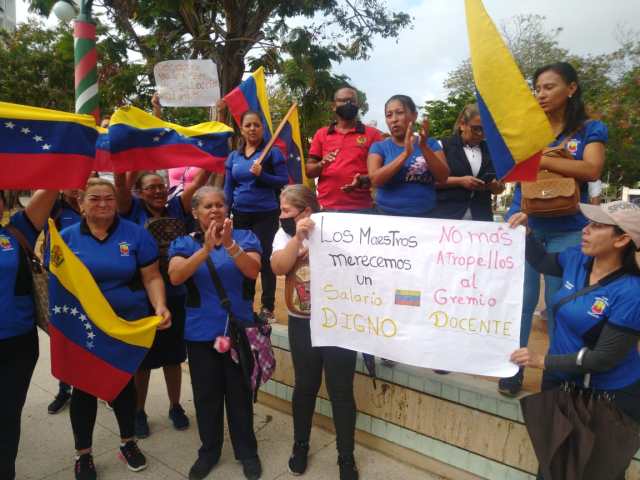
Just nine days after the start of a new year, the demands of the educator’s unions of the country remain the same: better conditions in the institutions, a salary according to their needs and the immediate elimination of the Onapre instructions.
By Lapatilla Correspondent
This is how this Monday, January 9th, from all corners of the country, teachers came together in massive protests to demand their labor rights.
Lapatilla correspondents closely followed the unions taking to the streets in various regions of the national territory.
“You Cannot Teach If You Are Hungry”

Teachers from the center of the country said they were present at this Monday’s protest. The union turned to the streets in the states of Aragua and Carabobo, raising its voice once again against the indifference of Nicolás Maduro’s regime.
“We are demonstrating the general discontent of public workers, and we are not only in the Bicentennial Square of Maracay, we are also protesting in La Victoria, in San Mateo and in the other states of the country,” said Ricardo Guerra, educator and member of the movement “All for education”.
Likewise, the president of the College of Teachers in Carabobo, Zaida Silva, demanded that the Ministry of Education sign the collective contract for the benefit of all workers.
Ms. Silva considered that, with the days of protests, teachers are teaching students to fight for their rights.
“We just receive a handout”

Venezuelan teachers are the worst paid in the continent, this situation has generated the abandonment by the union of the country’s classrooms, reiterating in each and every protest “Who takes away our children’s hunger?”
Furthermore, the teachers from the center west of the country also were present, demanding to be heard by Nicolás Maduro’s regime.
In Falcón, teachers denounced that their salary is not enough to pay for the month’s bus fares and get to their classrooms.
For its part, the Zulia State Teachers’ Union denounced that a “grade III education professional”, with eight years of experience, earns a salary of 30 U.S. dollars a month, which is why they will begin a series of assemblies to inform the student community about the lousy salary.
In the state of Lara, the educational union stated that the Ministry of Education owes them 280% of what was stipulated in the collective contract signed at the end of 2022.
Likewise, on the Táchira border, specifically in the Pedro María Ureña Municipality, teacher Hilda Vivas highlighted that although they go to the classrooms by vocation, “this vocation is at its ending” since they must bring sustenance to their homes and cannot continue living in misery, because that’s why they studied for, to avoid misery.
The Indolent Gaze Of The Regime
During all these years, the country’s educators have many times raised their voices in protest to be heard by the Chavista leadership, however, they have only received the indolent gaze and sabotage by government’s militants when they took to the streets.
This situation arose in the Sucre State, however, it was not an impediment to demand what had been proposed for this Monday throughout the country, decent “working conditions and a decent salary.”
In Anzoátegui, the protesters sent a question to the Minister of Education: “I would like to ask her if she lives on a minimum wage. If she does, we will remain calm. However, we know that this is not the case and that is why we take to the streets to demand what corresponds to us.”
Likewise, in Nueva Esparta State, one of the teachers regretted having had to spend the worst Christmas of her life, because the incessant rise in the dollar exchange rate dissolved the little bonuses she received in Bolivars.
“We Will Continue Having Assemblies”
In addition to demands on their working conditions, the teachers stated that they continue to hold permanent assemblies, integrating not only the educational union but also parents and students, emphasizing that the fight belongs to everyone.
In the Guayana region of the country, the teachers took to the streets in Puerto Ordaz and also assured that they would call for a great march on January 23rd.
Julio Véliz, representative of the Venezuelan Federation of Teachers in Caroní, assured that the teachers’ union does not have “social security, (no insurance for) in clinics, hospitals, we have nowhere to drop dead, but before we used to have those benefits and they were taken away.”
Education in the country has been affected by the lack of investment and commitment on the part of Nicolás Maduro’s regime, being an important guild for the training and quality of citizens of a society.
This is union that raises its voice once again seeking to be heard in a year that has just begun but its needs remain the same: quality of life and labor rights.

